Libyan leader denies fleeing as protests continue
- Published
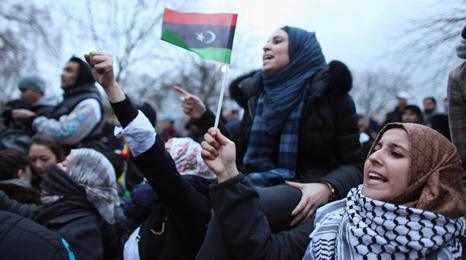
Anti-Gaddafi protesters gathered outside the Libyan embassy in London
Libyan anti-government protesters have clashed with security forces for a second night in the country's capital, Tripoli.
230 people have been reportedly killed in violent attacks by state forces - but human rights campaigners say the true figure could be much higher.
On Monday the country's leader Colonel Muammar Gaddafi appeared on state TV to deny rumours he had fled to South America, blaming media "dogs" for the speculation.
His 40 year rule is thought to be close to collapse - some journalists in the region say he has lost the support of the entire country.
WHAT'S HAPPENING NOW?
Libya borders Egypt and Tunisia - two of the countries where uprisings have toppled unpopular rulers in recent weeks.
The east of the country is said to be almost entirely out of the government's control - and protests have been gathering momentum in the capital.
Colonel Gaddafi's son, Saif al-Islam, has warned that the country risks a descent into civil war.
He appeared on TV yesterday, vowing to keep fighting - to the last man, to the last bullet.
There are reports that troops who refuse to fire on demonstrators themselves face severe punishments.
2 airforce pilots fled the country with their planes and claimed asylum in Malta.
Around the world, formerly loyal Libyan diplomats have quit their jobs - saying they can't support the mass-killing of their own people.
As well as claims of torture and disappearances, ordinary people say they have seen little benefit from their country's enormous oil wealth.
It's thought that one-third of Libyans live in poverty, although reliable statistics are hard to come by.
Steps were being taken in recent weeks to try to quell unrest.
According to a Libya-based Facebook group, the government's been offering to pay student tuition-fees.
Colonel Gaddafi recently said he would also abolish some of his government's ministries, and pass the money saved onto the population.
It is also reported on a government-run newspaper that 150,000 lap-top computers are being handed out to young people.
WHO IS COLONEL GADDAFI?
The Libyan leader was just 27 when he led a bloodless coup against the country's king.
He has ruled for more than 40 years.
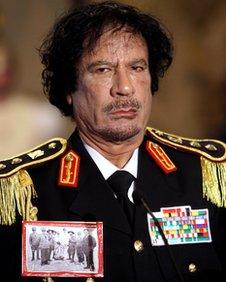
Colonel Gaddafi has ruled longer than any leader in Africa or the Middle East
It makes-him the longest-lived leader in Africa or the Middle East.
He's become famous over the years for his flamboyant dress-sense, and for travelling overseas with an enormous Bedouin-style tent.
Much has also been written about his personal security team - known collectively as the Amazonian Guard.
The group is entirely female, heavily armed, and trained in martial-arts.
All women who qualify must supposedly be virgins, and are hand-picked by Gaddafi himself.
He claims to rule over a democracy, and presents himself as his country's spiritual guide.
He insists that the political system in his country is fair - but critics call it a brutal military dictatorship.
Previous anti-government protests have been ruthlessly crushed.
Torture and disappearances over the years have also been reported.
LIBYA, THE UK AND AMERICA
Relations between Libya and the UK and America had been improving - ever since Libya finally admitted it was responsible for a 1988 plane bombing, and offered compensation to victims' families.
The flight crash-landed on the Scottish town of Lockerbie, killing 270 people.
Most of those on board were American.
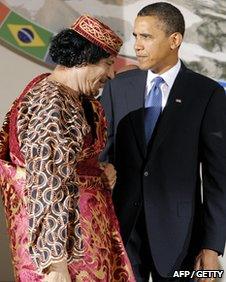
Colonel Gaddafi, pictured at a G8 summit with US President Obama in July 2009.
The US had previously launched air-strikes on Libya, in retaliation for attacks in Europe.
Dozens of people were killed, including Colonel Gaddafi's adopted daughter.
In a separate incident in 1984, a woman police officer called Yvonne Fletcher was shot and killed by someone who had fired a gun from inside London's Libyan embassy.
Since then, Libya has also ended its public support and funding for groups linked with terrorism - like the IRA and the Palestinian PLO - and apparently stopped trying to build so-called weapons of mass destruction.
Tony Blair visited Libya to be pictured with its leader in 2004 when he was Prime Minister.
That was seen as a watershed moment, welcoming Colonel Gaddafi into the political mainstream.
Added together, the measures meant Libya started to be seen as a place the rest of the world could do business with.
British and international investors have flocked to the country in the last 5 years, including big oil firms like BP and Exxon Mobil.
It is now the world's 12th largest exporter of oil.
- Published1 February 2011
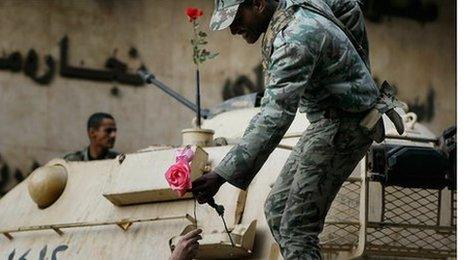
- Published2 February 2011
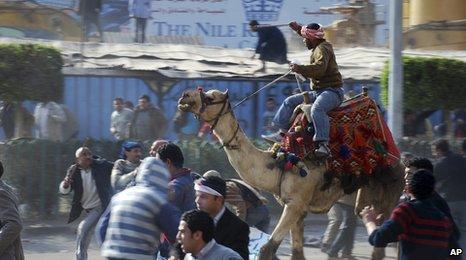
- Published24 August 2009